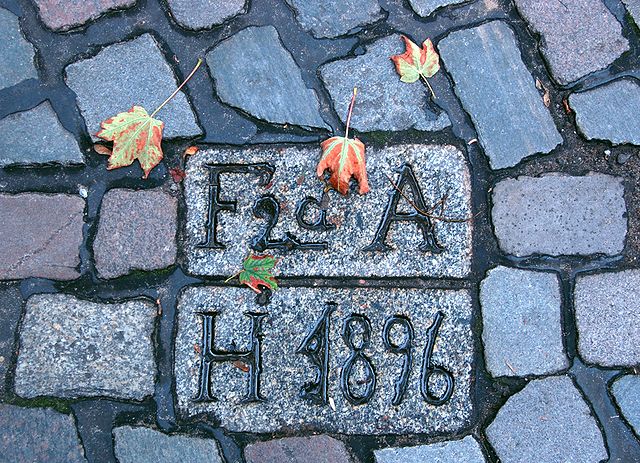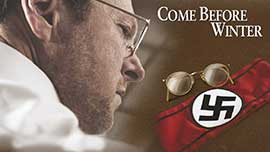A FEW GERMAN PASTORS REJECTED NAZI CONTROL OVER SPIRITUAL LIFE

[ABOVE—Old boundary stone between the once separate cities of Altona and Hamburg, 1896, Brigittenstrasse. (Freundlicher / [GNU free documentation license Wikimedia) File:StadtgrenzeAltonaHamburg.jpg Freundlicher at the German-language Wikipedia, the copyright holder of this work, hereby publishes it under the following license: Permission is granted to copy, distribute and/or modify this document under the terms of the GNU Free Documentation License, Version 1.2 or any later version published by the Free Software Foundation; with no Invariant Sections, no Front-Cover Texts, and no Back-Cover Texts.]
IN JULY 1932, Communists, Nazis, and police clashed in the streets of Altona, near Hamburg, Germany. Eighteen died. Hans Asmussen, a local pastor, preached a funeral service in which he appealed for peace and argued that vengeance was not the answer. Hitler, however, labeled the dead Nazis “Christian martyrs” and leveraged the incident to instigate more demonstrations. Asmussen wrote directly to Hitler and later denounced his actions.
Asmussen had always been outspoken in his beliefs. After service in World War I, he had studied theology at the Universities of Kiel and Tübingen. At Kiel he participated in the League of Lutheran Brethren which opposed liberal theology. Having championed traditional doctrines, he was quick to recognize the danger of aligning the church with a political party—which was exactly what Hitler intended to do.
One of the fruits of Asmussen’s outspokenness was the Altona Confession which he had a leading role in writing. It was widely circulated in Germany. Titled The Dangers and Disruptions of Public Life, it was a statement published by the pastors of Altona on this day 11 January 1933. Acknowledging that grievous wrongs of public life could not be ignored, it nonetheless asserted that the church should not form political alliances. Instead it must proclaim the gospel and hone consciences. To subject the church’s proclamation to political power was to pervert political power into a religion hostile to Christianity. Moreover, the confession asserted that the church was for all people, not just for a favored class.
Because the confession rejected Nazi control over spiritual life, Hitler considered it provocative: it challenged Nazi claims to total authority, by binding all earthly authorities under the authority of God’s Word.
As Hitler consolidated power, he brought the German Lutheran Church under Nazi dominance, creating the so-called “German Christians.” Asmussen then became a leading figure in drafting another strong statement, the Barmen Declaration, which rejected the errors of the Nazi church. Consequently, Hitler forced Asmussen into early retirement in 1934. But the pastor continued teaching and writing in ways that challenged Hitler. As a result, he was among pastors whose speech the Nazis muzzled. In 1941 he was imprisoned.
After the war, Asmussen joined Martin Niemöller and others who apologized for the complicity of the church with Hitler. He also became active in the international ecumenical movement. He died at the end of 1968.
—Dan Graves
----- ----- -----
Two Christians who resisted the Nazis were Dietrich Bonhoeffer and Sefton Delmer. Their stories are told in the video Come Before Winter. Watch it at RedeemTV.
Come Before Winter can also be purchased at Vision Video.
For more background, read "Christians against Nazis: the German Confessing Church" in Christian History #9, Heritage of Freedom: Dissenters, Reformers, and Pioneers
and "The church of the bystanders" in Christian History #121, Faith in the Foxholes









